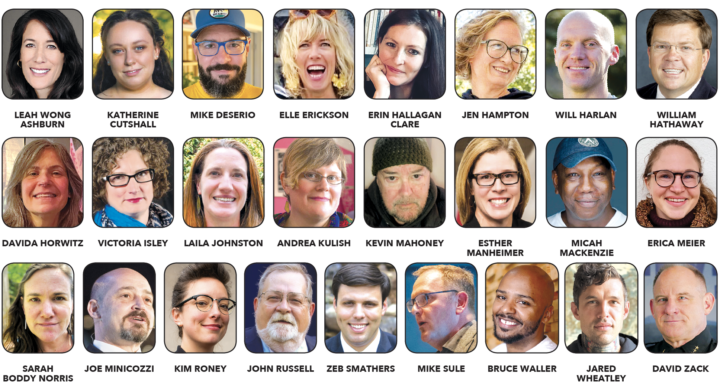The World Health Organization defines quality of life as “an individual’s perception of their position in life in context of the culture and value systems in which they live and in relation to their goals, expectations, standards and concerns.”
But what does quality of life mean in Western North Carolina? For the 2022 Year In Review, Xpress asked community members to share their thoughts.
Though none of the respondents is homeless, they all had thoughts on the housing crisis. Many see Asheville city government as uncaring, prioritizing tourists and transplants over existing residents.
Perhaps surprisingly in the face of rising rents and inflation, not everyone was negative when asked about the economy’s impact on their lives this year. A few framed economic challenges as opportunities to become more creative.
As for what aspect of community life they were most excited to see return as concerns over the COVID-19 pandemic wane, respondents overwhelmingly chose live, in-person events.
Responses were more muted regarding quality of life in the future. Environmental and economic sustainability, community polarization and affordable housing were all cited as causes for concern. Yet respondents also shared reasons to hope.
The biggest takeaway from these answers may be optimism that community members can come together to find solutions to pressing problems. 
What does the increase in Asheville’s homeless population suggest about the quality of life in WNC?
“It suggests that quality of life in our area is out of reach for many individuals who are under increasing pressure to jump higher and leap further with less support and resources.” — Mike DeSerio, AHOPE outreach program manager, Homeward Bound
“Our community continues to identify ways to help the most vulnerable. This year there are 105 Code Purple shelter beds — nearly 30 more than 2021. The city is also working with providers like Homeward Bound to create 200 units of permanent supportive housing for people transitioning out of houselessness.” — Esther Manheimer, Asheville mayor
“Our cost of living is skyrocketing, and wages aren’t keeping up. Our mountain home is a climate refuge, and our systems are not prepared to respond. My source of hope is knowing our residents demand better.” — Kim Roney, Asheville City Council member
“We are causing housing problems because we don’t deal with policy in an adult manner. We could have eliminated [Buncombe County’s] $120 million wealth-fare, used the $70 million for what we bonded and then had $50 million left over for homelessness. It’s not hard to solve these problems; it just takes courage and accountability” — Joe Minicozzi, head of consulting firm Urban3
“Neither city nor county cares enough about this issue. I’ve lived in Asheville since 2008 and the homeless population has exploded. We need a strong coalition of concerned citizens from the medical and business communities and the homeless speaking for themselves to redirect community health priorities.” — Kevin Mahoney, peer support specialist
“As rent has risen exponentially over the past 20 years, housing stock has been depleted by short-term rentals. The data show that people are moving in from elsewhere and displacing local residents who then have no affordable options.” — Sarah Boddy Norris, activist and teacher
What do you think will have the biggest impact on the quality of life for future generations living in WNC?
“Quality of life for future generations in WNC will be greatly impacted by the availability of a health care workforce providing access to essential health and wellness services. We need better funding for local public health and more regional collaboration among hospitals, federally qualified health centers, nonprofits and funders.” — William Hathaway, CEO, Mountain Area Health Education Center
“My biggest concerns are inequity and exploitation (of all life). But there are large coalitions currently organizing across class, race, gender, age, ability, religion and sexual orientation to support a vibrant, livable future. I hope they will have the biggest impact on the future of WNC.” — Erica Meier, hub coordinator, Sunrise Movement Asheville
“The biggest impacts to quality of life for future generations will be sustainability and community. Sustainability goes beyond environmental concerns to include our willingness to allow critical conversations around decision-making, planning and development. Dissenting opinions on housing, jobs and transportation will have to be respectfully heard and reconciled.” — Jared Wheatley, founder, Indigenous Walls Project
“With the Pisgah Nantahala Forest Plan, the U.S. Forest Service is planning to reduce protections for the 1.1 million-acre forest and quadruple logging, even though 96% of public comments support less logging and more protected areas. This 30-year plan will affect the drinking water, air quality and health of everyone in WNC.” — Will Harlan, conservation biologist, Center for Biological Diversity
“To positively impact generational change, we need to think bigger. More ‘and’ and fewer ‘either/or’ conversations will foster collaboration and create opportunities for more people to succeed. We are fortunate to be managing the challenges of success rather than struggling in an atrophying community.” — Vic Isley, president and CEO, Explore Asheville
“Climate change will have the biggest impact on the lives of future generations living in WNC. As an outdoor theater, we’ve experienced more rain cancellations in the last two years than in the previous 10 combined. WNC is as susceptible to changes in weather patterns as any other place.” — John Russell, executive director, Montford Park Players
“Participation. My wish is that people consider why they are passionate about living here and then ask how they can contribute to its growth and sustainability. Being intentional with our actions will have the greatest impact for generations to come.” — Erin Hallagan Clare, founder/artistic director, Story Parlor
“Transportation planning. According to the N.C. Department of Environmental Quality, the biggest threat to our air quality is vehicular emissions. We either plan and implement a multimodal approach to our transportation needs or commit ourselves to more pollution and asthma.” — Mike Sule, executive director, Asheville on Bikes
How did the economy affect your professional life this year?
“As an entrepreneur, I get to face all kinds of challenges. It excites me. One of the greatest gifts humans have is the ability to adapt and overcome in extraordinary ways. The marketplace has pushed me to become the best professional that I can be.” — Bruce Waller, executive director, Black Wall Street AVL
“With higher gas prices and inflation, the summer and early autumn sales were very slow for a lot of artists and businesses in the [River Arts District]. Fortunately, things picked up in October.” — Andrea Kulish, mixed-media artist
“The movie theater business hasn’t been stellar this year, but I don’t think it’s the economy as much as remnants of COVID closures and changes in behavior. We have seen a steady return of patrons to the theater.” — Davida Horwitz, co-owner, Grail Moviehouse
“I was hopeful this summer when things seemed to be picking up, but it never quite reached the levels of previous years. I’m only working part-time hours at my kitchen job because business has slowed, and I’ve had to increase my side hustling to make ends meet.” — Jen Hampton, organizer, Asheville Food and Beverage United
“It’s been a time of rebalancing. Increased costs for raw materials, transportation and staff have all added pressure, and consumers are price conscious. We have to deliver more than great beer — we have to deliver company values, which our taprooms do well.” – Leah Wong Ashburn, president, Highland Brewing Co.
“Recovery looks like downtown businesses working together to make sure that they’re not only taking care of their own employees and customers but also each other.” — Micah Mackenzie, photographer
“We have seen a massive increase in helpline calls, requests for pet food assistance and need for veterinary assistance vouchers. We are not affiliated with the Humane Society of the U.S. or the ASPCA and rely on local donations. The economy has definitely affected giving this year.” — Laila Johnston, donor relations director, Asheville Humane Society
What part of community life were you most excited to see return this year?
“Live arts! Of all the outlets that have the power to remind us of our shared humanity — to connect, learn and even change — live arts take the cake.” — Erin Hallagan Clare
“I have been delighted to watch the library return to a hub of community life over the course of the last year. It’s been exciting to see families returning for activities, like Lego club and story time, and to see an uptick in new and familiar faces hanging around Special Collections.” — Katherine Cutshall, manager, Buncombe County Special Collections
“I was most excited to see the Asheville Holiday Parade return. Attendance was higher this year, and I sensed a very positive vibe in the city. I walked the entire route and received so many words of encouragement from our community. Many officers shared similar experiences.” — David Zack, chief of police, Asheville Police Department
“Live music. It’s so important for people to be close to one another, having a good time, dancing and hugging. Asheville’s live music scene supports all of that.” — Elle Erickson, founder, The Booth Fairy
“Smiles on people’s faces. The last several years have been extremely difficult, especially for our children and the elderly. If you are not finding ways to bring joy back into people’s lives, you are missing out on an opportunity to do good.” — Zeb Smathers, Canton mayor



Before you comment
The comments section is here to provide a platform for civil dialogue on the issues we face together as a local community. Xpress is committed to offering this platform for all voices, but when the tone of the discussion gets nasty or strays off topic, we believe many people choose not to participate. Xpress editors are determined to moderate comments to ensure a constructive interchange is maintained. All comments judged not to be in keeping with the spirit of civil discourse will be removed and repeat violators will be banned. See here for our terms of service. Thank you for being part of this effort to promote respectful discussion.